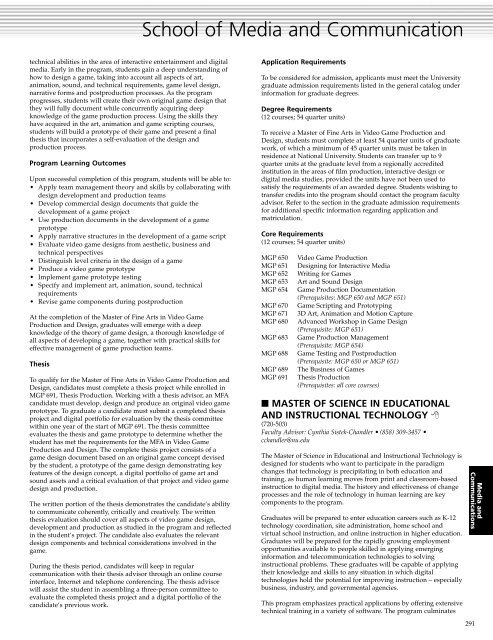Catalog 73 - National University
Catalog 73 - National University
Catalog 73 - National University
- No tags were found...
You also want an ePaper? Increase the reach of your titles
YUMPU automatically turns print PDFs into web optimized ePapers that Google loves.
School of Media and Communicationtechnical abilities in the area of interactive entertainment and digitalmedia. Early in the program, students gain a deep understanding ofhow to design a game, taking into account all aspects of art,animation, sound, and technical requirements, game level design,narrative forms and postproduction processes. As the programprogresses, students will create their own original game design thatthey will fully document while concurrently acquiring deepknowledge of the game production process. Using the skills theyhave acquired in the art, animation and game scripting courses,students will build a prototype of their game and present a finalthesis that incorporates a self-evaluation of the design andproduction process.Program Learning OutcomesUpon successful completion of this program, students will be able to:• Apply team management theory and skills by collaborating withdesign development and production teams• Develop commercial design documents that guide thedevelopment of a game project• Use production documents in the development of a gameprototype• Apply narrative structures in the development of a game script• Evaluate video game designs from aesthetic, business andtechnical perspectives• Distinguish level criteria in the design of a game• Produce a video game prototype• Implement game prototype testing• Specify and implement art, animation, sound, technicalrequirements• Revise game components during postproductionAt the completion of the Master of Fine Arts in Video GameProduction and Design, graduates will emerge with a deepknowledge of the theory of game design, a thorough knowledge ofall aspects of developing a game, together with practical skills foreffective management of game production teams.ThesisTo qualify for the Master of Fine Arts in Video Game Production andDesign, candidates must complete a thesis project while enrolled inMGP 691, Thesis Production. Working with a thesis advisor, an MFAcandidate must develop, design and produce an original video gameprototype. To graduate a candidate must submit a completed thesisproject and digital portfolio for evaluation by the thesis committeewithin one year of the start of MGP 691. The thesis committeeevaluates the thesis and game prototype to determine whether thestudent has met the requirements for the MFA in Video GameProduction and Design. The complete thesis project consists of agame design document based on an original game concept devisedby the student, a prototype of the game design demonstrating keyfeatures of the design concept, a digital portfolio of game art andsound assets and a critical evaluation of that project and video gamedesign and production.The written portion of the thesis demonstrates the candidate’s abilityto communicate coherently, critically and creatively. The writtenthesis evaluation should cover all aspects of video game design,development and production as studied in the program and reflectedin the student’s project. The candidate also evaluates the relevantdesign components and technical considerations involved in thegame.During the thesis period, candidates will keep in regularcommunication with their thesis advisor through an online courseinterface, Internet and telephone conferencing. The thesis advisorwill assist the student in assembling a three-person committee toevaluate the completed thesis project and a digital portfolio of thecandidate’s previous work.Application RequirementsTo be considered for admission, applicants must meet the <strong>University</strong>graduate admission requirements listed in the general catalog underinformation for graduate degrees.Degree Requirements(12 courses; 54 quarter units)To receive a Master of Fine Arts in Video Game Production andDesign, students must complete at least 54 quarter units of graduatework, of which a minimum of 45 quarter units must be taken inresidence at <strong>National</strong> <strong>University</strong>. Students can transfer up to 9quarter units at the graduate level from a regionally accreditedinstitution in the areas of film production, interactive design ordigital media studies, provided the units have not been used tosatisfy the requirements of an awarded degree. Students wishing totransfer credits into the program should contact the program facultyadvisor. Refer to the section in the graduate admission requirementsfor additional specific information regarding application andmatriculation.Core Requirements(12 courses; 54 quarter units)MGP 650MGP 651MGP 652MGP 653MGP 654MGP 670MGP 671MGP 680MGP 683MGP 688MGP 689MGP 691Video Game ProductionDesigning for Interactive MediaWriting for GamesArt and Sound DesignGame Production Documentation(Prerequisites: MGP 650 and MGP 651)Game Scripting and Prototyping3D Art, Animation and Motion CaptureAdvanced Workshop in Game Design(Prerequisite: MGP 651)Game Production Management(Prerequisite: MGP 654)Game Testing and Postproduction(Prerequisite: MGP 650 or MGP 651)The Business of GamesThesis Production(Prerequisites: all core courses)■ MASTER OF SCIENCE IN EDUCATIONALAND INSTRUCTIONAL TECHNOLOGY (720-503)Faculty Advisor: Cynthia Sistek-Chandler • (858) 309-3457 •cchandler@nu.eduThe Master of Science in Educational and Instructional Technology isdesigned for students who want to participate in the paradigmchanges that technology is precipitating in both education andtraining, as human learning moves from print and classroom-basedinstruction to digital media. The history and effectiveness of changeprocesses and the role of technology in human learning are keycomponents to the program.Graduates will be prepared to enter education careers such as K-12technology coordination, site administration, home school andvirtual school instruction, and online instruction in higher education.Graduates will be prepared for the rapidly growing employmentopportunities available to people skilled in applying emerginginformation and telecommunication technologies to solvinginstructional problems. These graduates will be capable of applyingtheir knowledge and skills to any situation in which digitaltechnologies hold the potential for improving instruction – especiallybusiness, industry, and governmental agencies.This program emphasizes practical applications by offering extensivetechnical training in a variety of software. The program culminates291Media andCommunications
















